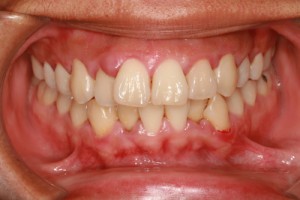Pregnancy Gingivitis and Pregnancy Tumors
Pregnancy gingivitis is caused by the hormonal changes that increase the blood flow to the gum tissue and cause your gums to be more sensitive, irritable, and swollen This makes it easier for plaque to build up on your teeth and makes you more susceptible to gingivitis.
Pregnancy causes hormonal changes that increase your risk for developing oral health problems like gingivitis (inflammation of the gums) and Periodontitis (gum disease). As a result of varying hormone levels, 40% of women will develop gingivitis sometime during their pregnancy — a condition called pregnancy gingivitis.
The increased level of progesterone in pregnancy may make it easier for certain gingivitis-causing bacteria to grow, as well as make gum tissue more sensitive to plaque and exaggerate the body’s response to the toxins (poisons) that result from plaque. In fact, if you already have significant gum disease, being pregnant may make it worse.
Pregnancy Gingivitis Symptoms
Gingivitis is most common during months two to eight of pregnancy. Tell your dental professional when you are pregnant—he or she may recommend more frequent dental cleanings during the second trimester or early in the third trimester to help combat the effects of increased progesterone and help you avoid gingivitis. This extra plaque may cause swelling, bleeding, redness and/or tenderness in the gums. As a result, pregnant women are more likely to develop gingivitis even if they follow a consistent oral health care routine.
Pregnancy Gingivitis Treatments and Prevention
To control the amount of plaque in your mouth and to prevent gingivitis, follow these steps to reduce the bacteria that can lead to pregnancy gingivitis.
Steps to Prevent Pregnancy Gingivitis
- Brush twice a day, preferably in the morning and at night
- Take your time; you should spend at least two minutes brushing your teeth
- Be sure to use anti-plaque toothpaste to help protect your teeth from decay and gingivitis
- Rinse thoroughly after brushing to get rid of bacteria in hard-to-reach places
- Remember to floss daily to help avoid the build-up of bacteria
- Eat a healthy, balanced diet; be sure that you are getting enough calcium, vitamins D, C and A, phosphorous and protein.
- Avoid sugary snacks
- Continue to visit your dental professional regularly (once it is safe for the baby)




